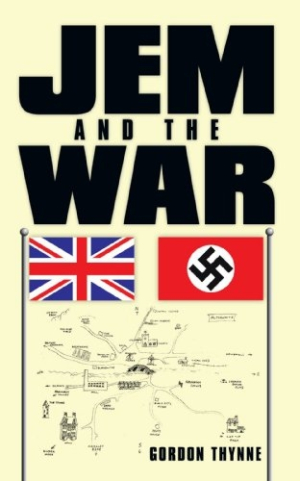Jem and the War
English author Gordon Thynne lived in the West Riding of Yorkshire for a few short years during his youth. Those years were so memorable that he has drawn upon them in writing his first novel, Jem and the War. World War II started during Thynne’s time in Yorkshire, and his memories contribute to a delightful tale of small-town life on the home front in the fictional village of Althwaite. Written with younger readers in mind, Jem and the War resembles the popular “stories for boys” of old; stories that always attracted their own female audience as well. Young George Malcolm Murgatroyd, nicknamed Jem, stars as the thoughtful and likable protagonist.
Jem is nine when the tale begins, and war is looming. Good-hearted and well-meaning, he is a rather normal boy who enjoys playing with his friends and trying to help others, occasionally finding himself in a scrape, but always appropriately penitent afterward. Once war is declared, he pitches in to welcome young evacuees to the village, trying to make them feel comfortable and accepted.
While Althwaite is not specifically a German target, many local men, including Jem’s father, are called up or volunteer for service, and the villagers left behind pull together in their country’s war effort. Even the children take part, assisting with vegetable gardening, collecting books for soldiers, and the like, all the while tasked with keeping their eyes open for unusual activities. Overactive imaginations mistake a young artist for a spy, and Jem is involved not only in saving her from an overzealous crowd, but also in helping her become part of the local community. Fancying themselves boy detectives, he and his best friend instigate an investigation into a theft case that the local police have abandoned. They later take part in the capture of a trio of thieves in a different case, with Jem suffering a broken collarbone for his participation.
Jem and the War is a story of growing up as much as it is a story of wartime. Jem’s many “adventures, secrets, setbacks, triumphs,” and experiences leave him with greater perspective and maturity. He realizes that having branched out and “become so involved with others” has allowed him to better understand and appreciate those around him. He will never be involved in the war in the way his father is, but he does his part. When his father, wounded and partially disabled, is sent home from North Africa, Jem learns a bit more about “real” war, yet he never in fact sees “how horrific war really is.” It is his good fortune.
Thynne’s story is a gentle one, well suited for the younger audience he seeks. His tale is both old fashioned and appealing, and adults, too, will find much to enjoy. There are neither battle scenes nor bloody encounters, no one swears, and the content is truly suitable for general audiences. The text is sprinkled with fantastic vocabulary words of the type student readers will eventually encounter on their SATs, and the plotline includes educational information about small-town life in England during WWII.
Often humorous and always moral, Jem and the War is an enchanting book about growing up in a place and time that somehow seem much farther away than they actually are.
Reviewed by
Cheryl Hibbard
Disclosure: This article is not an endorsement, but a review. The publisher of this book provided free copies of the book and paid a small fee to have their book reviewed by a professional reviewer. Foreword Reviews and Clarion Reviews make no guarantee that the publisher will receive a positive review. Foreword Magazine, Inc. is disclosing this in accordance with the Federal Trade Commission’s 16 CFR, Part 255.

